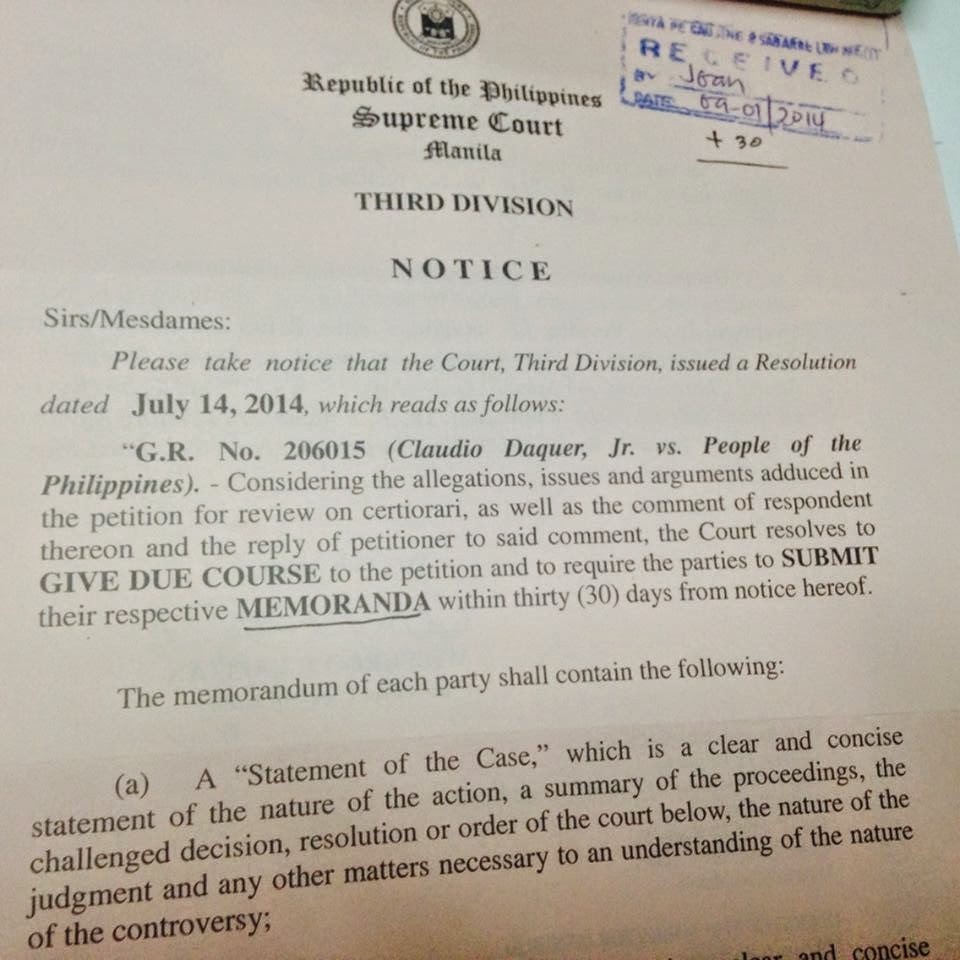SC gives due course to ALAM, HMMI petition for Puerto journalist convicted for writing that city sports exec was 'kuto nais maging kalabaw'
SC gives due course to ALAM, HMMI petition
for Puerto journalist convicted for writing that
city sports exec was 'kuto nais maging kalabaw'
 |
| The Supreme Court order giving due course to the petition. |
YEHEY!
Supreme Court gave due course to my petition for a poor journalist of Puerto Princesa, Claudio Daquer, who was convicted by RTC Br 47 there for libel because he wrote in his opinion column that a city sports official was "kuto na nais maging kalabaw."
This is another good note in my advocacy for press freedom.
Alab ng Mamahayag (ALAM) chairman Jerry S. Yap paid for the filing fees and the expenses in reproductions and all others.
This is one project of ALAM for its press members.
Hukuman ng Mamamayan Movement Inc. (HMMI) provided the legal skills and talent for this petition, courtesy of its president Berteni "Toto" Cataluña Causing.
I read again the petition I wrote and I was amazed by the power of my arguments. I FOUND OUT THAT I WAS ACTUALLY PROPOSING A NEW LEGAL DOCTRINE IN LIBEL LAW.
I am proposing here that as a general rule, FALSITY MALICE TEST must be applied; and only as an exception to the rule that RECKLESS MALICE TEST APPLIES.
To understand my argument, I argued that local weekly newspaper columnist Claudio Daquer must be acquitted because of the following:
(a) He wrote opinions that the offended Puerto Princesa City Sports Official Anrie A. Grande was like a "kuto na gusto maging kalabaw";
(b) The basis of Daquer's opinion was the narration of facts that Mr. Grande was bullying other sports officials like he was blessed to do so by then City Mayor Edward S. Hagedorn;
(c) Mr. Grande merely made denials that these bullying acts did not happen and he did not submit evidence therefor;
(d) It was the obligation of the prosecution to prove that the claim of the happening of "bullying acts" did not happen and Mr. Daquer, as the accused, had no obligation to prove that "bullying acts" occurred because he can even remain silent as a matter of right while rely at the same time that the prosecution has the burden of proof;
(e) For failure to prove that the "bullying acts" claims were false, these should now be presumed as true;
(f) And if the opinion of Mr. Daquer that Mr. Grande was like a "kuto na nais maging kalabaw" was founded on the claims that "bullying acts" occurred because these were not proven to be false by Mr. Grande, then the opinion of Mr. Daquer is not libel by the application of the Fair Comments Law.
With these reasons, I then argued that the Court of Appeals is wrong in applying the reckless malice standard, which means that Mr. Daquer must cross-check his facts of "bullying acts" and that his failure to cross-check to know whether it was true made him reckless and guilty.
I hope the Supreme Court will side with my new theory that: FALSE MALICE TEST MUST APPLY AS A GENERAL RULE and that RECKLESS MALICE MUST ONLY BE USED AS AN EXCEPTION.
It is suspense.


Comments